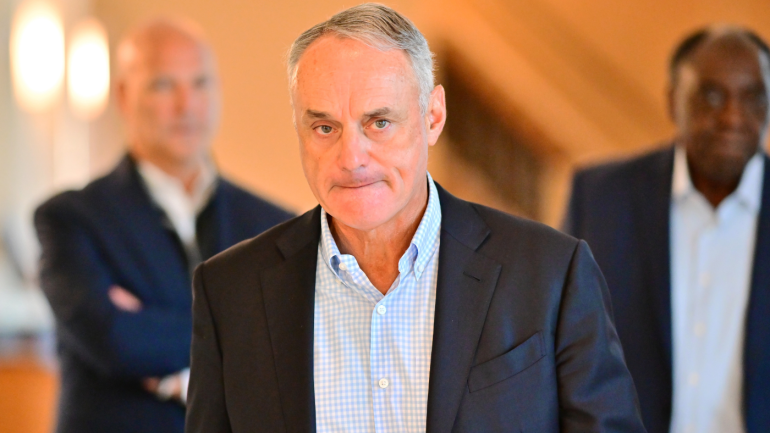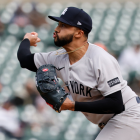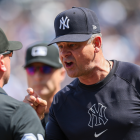
Major League Baseball's owner-imposed lockout, now nearly three months old, is entering its most pivotal day yet. The league has threatened to cancel regular season games if Monday, Feb. 28, passes without the two sides reaching a deal on a new collective bargaining agreement. The union, for its part, has not consented to that deadline. It's unknown if the league would hold off on cancellations if it feels that enough progress is being made in talks to warrant optimism about reaching a deal in the coming days.
The league characterized Sunday's conversations with the union as "productive." No items were checked off the list and no formal proposals were made, however, and the two sides were said to remain far apart on several issues.
Should the league make good on its threat, this will mark the first time since 1995 that a work stoppage has resulted in missed regular season games. (MLB, of course, played a reduced schedule in 2020 in response to the COVID-19 pandemic.) It's worth remembering that the league instituted the lockout not by necessity but by choice, labeling it a defensive mechanism that was designed to speed up negotiations. The league then waited six-plus weeks to deliver its first proposal to the players.
With that background out of the way, let's use the space below to recap each side's last reported stance on the most important items on the agenda.
Competitive Balance Tax
CBS Sports recently covered why the CBT, or the luxury tax, is such a hot button issue. The league offered on Sunday to ditch draft-pick compensation in exchange for higher tax rates. The league is said to be offering higher tax thresholds as well, albeit not too far beyond last season's figure of $210 million. It's unclear if the league is still requesting additional draft-pick penalties for clearing each level of the tax, as it had in previous proposals. (The league had also proposed getting rid of the repeater multiplier, meaning that teams would pay the same rate regardless of how many times they had surpassed the CBT threshold.)
Revenue sharing
The league has thus far refused to engage on changes to the revenue sharing system. The union's latest proposal asked to shave $30 million from the revenue sharing pool, and for the implementation of an incentive-based pool allowing for a greater sum transferring from the large-market teams to the small.
Expanded postseason
Both sides are open to expanding the postseason beyond 10 teams. The union favors 12 teams, and has requested a "ghost win" format for the first round as a means of incentivizing regular-season performance. The league, meanwhile, wants to expand the postseason to 14 teams and doesn't appear keen on the "ghost win" idea. For whatever it's worth, the union has threatened to stop considering the expanded postseason if players are not afforded a 162-game season in 2022.
Super Two qualification
The union wants to increase the percentage of players who qualify for Super Two status -- that is, an additional year of arbitration for players with between two and three years of service time -- from 22 percent to 35 percent of the players with the most service time as a means of funneling more money toward players earlier in their careers. The league has so far refused to budge from 22 percent.
Minimum salary
The most recent report had the union seeking a $775,000 minimum in 2022 with $30,000 raises in subsequent seasons. The league has countered with a $640,000 minimum in 2022 and $10,000 raises each year. For reference, the minimum last season was $570,500.
Draft lottery
The lottery appeared to be an agreed-upon item as of a few days ago. The league has since requested that the lottery be contingent on the implementation of a 14-team postseason. It's unclear where the two sides stand on this heading into Monday's talks, but the union had wanted the top seven picks to be decided by the lottery as a means of curbing anti-competitive behavior.
![[object Object] Logo](https://sportshub.cbsistatic.com/i/2020/04/22/e9ceb731-8b3f-4c60-98fe-090ab66a2997/screen-shot-2020-04-22-at-11-04-56-am.png)


















